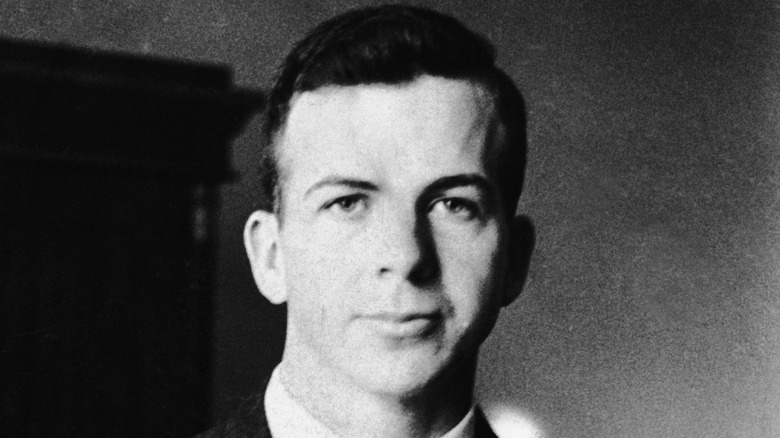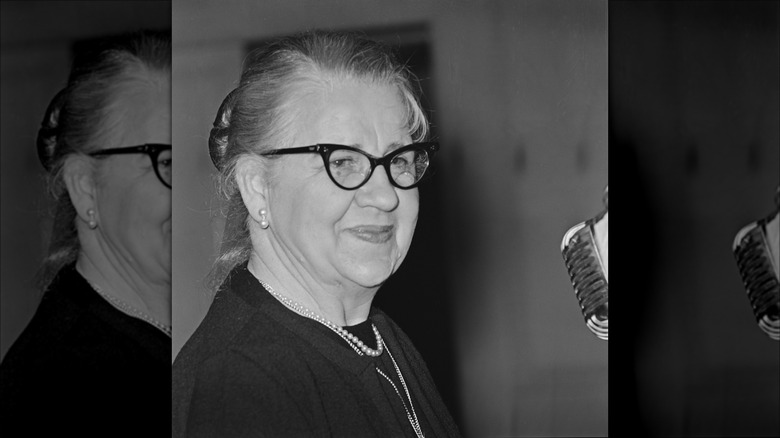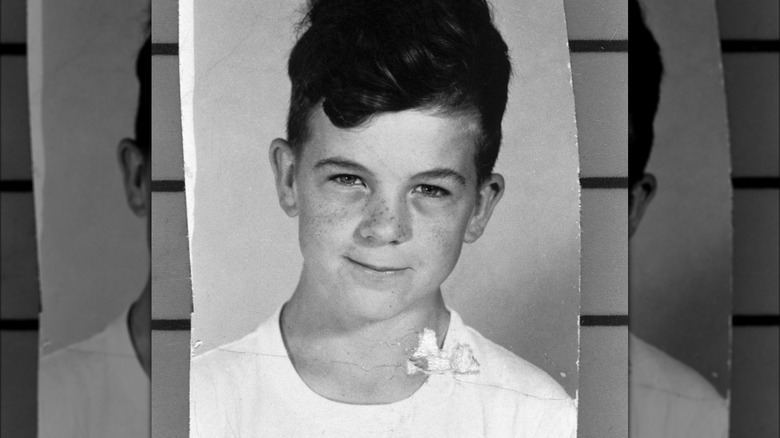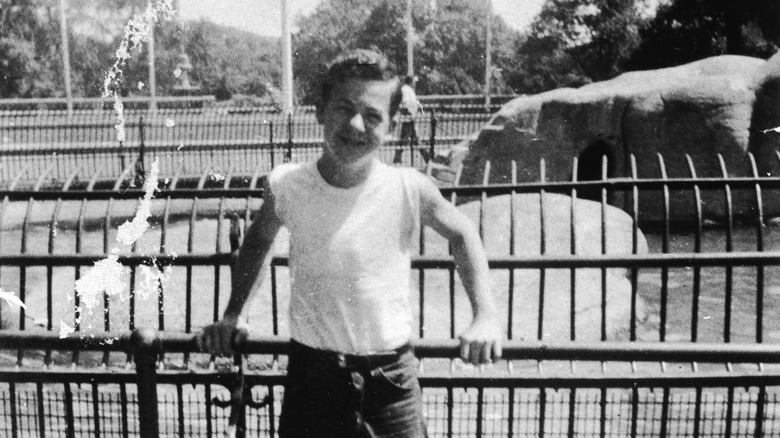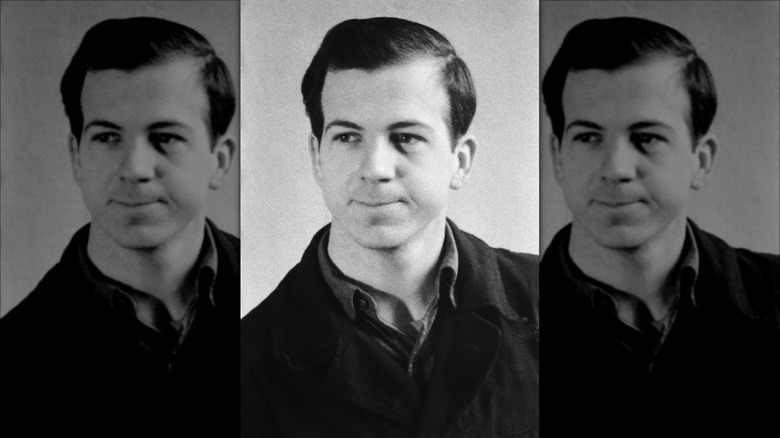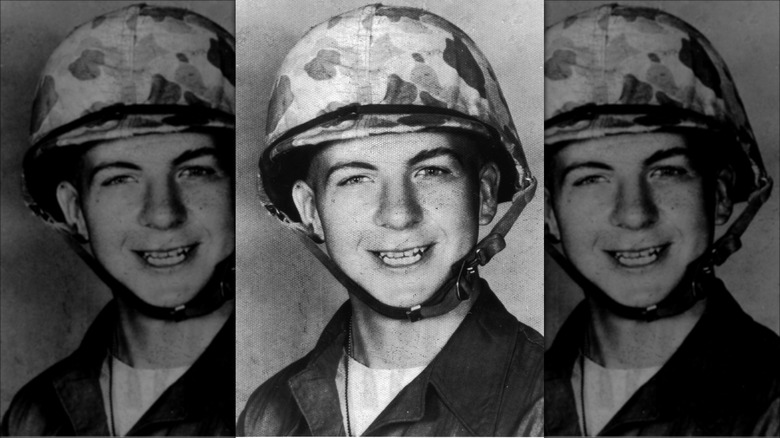Tragic Details About Lee Harvey Oswald's Childhood
To most Americans, the name Lee Harvey Oswald goes alongside that of John Wilkes Booth as one of the most reviled in the country's history. He was arrested and charged with the assassination of President John F. Kennedy, whom he shot from an upper window of the Texas Book Depository on November 22, 1963. When captured, Oswald denied murdering JFK, but he was never taken to trial. Oswald himself was shot and killed just two days later by an enraged gunman named Jack Ruby, who ambushed the former U.S. Marine as he was being led into custody. Oswald's own killing frustrated many who wanted to see him brought to justice for the assassination.
While some claim that there was a second shooter behind the famous grassy knoll on that fateful day, others say that Oswald — a known Marxist and one-time defector to the USSR — was a pawn in a greater plan to take down the president of the United States to destabilize the country at the height of the Cold War. Kennedy had, after all, shown great strength and determination in resolving the Cuban Missile Crisis. None of these theories have been proven. Nevertheless, both the Warren Commission — which published a report of its findings after an extensive investigation into the assassination — and conspiracists agree on one thing: Oswald had a tough childhood. By the time he was 24, he was reportedly a confused and traumatized young man who ended up changing the course of American history by the most horrifying means imaginable.
He was born into tragedy
Lee Harvey Oswald's family had experienced tragedy even before he was born, and in many ways, it was to shape the whole of his life. As the Warren Commission reported following a meticulous dissection of the assassin's family and backstory, he was born in New Orleans on October 18, 1939, the son of Robert and Marguerite Oswald. The young couple had each previously been married and tied the knot in 1933. Their young family included Oswald's older brother, Robert Jr., and half-brother John Pic, from Marguerite's former marriage. But the family was plunged into turmoil two months before Oswald's birth when his father died of a sudden heart attack, leaving Marguerite to give birth to Oswald alone and immediately set about the task of raising three boys on her own.
Money was tight in the Oswald household, and Marguerite initially stayed in the home that she and Robert owned. The Warren Commission suggests that the family subsisted on Robert's life insurance dividends during this time. But she soon rented out the property, and from then on, the Oswalds moved between various homes as Marguerite attempted to make ends meet.
His mother struggled to care for him
In the seminal documentary "Who Was Lee Harvey Oswald?" by Frontline PBS, Lee Harvey Oswald's older brother Robert claims that from an early age, the future presidential assassin gained a keen sense of being a burden to his mother Marguerite following the sudden death of his father, Robert Sr. But the traumas of his early life were soon compounded as his two older brothers were sent away to live at an orphanage run by the Evangelical Lutheran Bethlehem Orphan Asylum Association.
Oswald himself was too young to be admitted. But Marguerite — who had downsized to an apartment after putting the two older boys in care — had gained work as a telephone operator, and she had little time to spend on young Oswald. As a result, he was sent to live with his aunt and then a neighbor, though the Warren Commission report suggests that he didn't get adequate attention from any of his guardians. He was reportedly badly behaved.
At the age of 3, Oswald himself was sent to an orphanage, where he remained for just over a year bar occasional visits to his mother. The older Oswalds reportedly had good memories of the orphanage, but the family's peripatetic existence continued into their teenage years.
He became a truant
In 1945, Marguerite Oswald remarried once more after relocating to Texas, where her children were enrolled at school before the marriage broke down acrimoniously. Lee called to testify at the divorce hearing, though he never took the stand. The Warren Commission notes that a jury found Marguerite "guilty of excesses, cruel treatment, or outrages" on what the report called "special issues." Once her divorce was granted, she relocated again, this time to New York.
With his brothers enrolled at military college and his mother busy working, Oswald, who had reportedly grown more withdrawn, spent his days alone. He became a continuous truant, but despite his problems, he was curious about the world around him. Frontline PBS claims that Oswald would spend his days exploring the city on the subway, often hanging out at the Bronx Zoo and the area's museums and art galleries. However, his truancy didn't go unnoticed — his public school sought to reprimand Marguerite and encourage her to take control of her son. Eventually, Oswald was caught by a truancy officer who took him to Youth House, an institution aimed at addressing truancy.
He was emotionally troubled
At the center of Lee Harvey Oswald's stay at Youth House was a process of psychiatric assessment, which later became a major talking point during the Warren Commission. After all, investigators sought to ascertain the mentality of the man who had assassinated John F. Kennedy.
At Youth House, Oswald was assigned a social worker, Evelyn Siegel, who later told Frontline PBS that the boy in her charge had typically been left to fend for himself, to cook his own meals, and that he had developed an untrusting nature toward people as a result of his mother's neglect. Though Seigel describes Oswald as closed off emotionally — a common trait in those suffering trauma — she claims to have perceived no severe mental illness in the troubled teen. "He was not a mentally disturbed kid ... You got the feeling of a kid nobody gave a darn about," she said.
Living in a crime hotspot, he escaped into the marines
Eventually, Marguerite Oswald and her son, Lee, left New York and settled once again in his birthplace New Orleans. The Oswalds' new living arrangements in the notorious French Quarter were, at the time, in the epicenter of the city's underworld, populated by shady criminals. It is believed, however, that Lee Harvey Oswald himself may have been somewhat insulated from the world around him by a growing interest in left-wing politics.
Frontline PBS claims that John F. Kennedy's killer became interested in politics and world affairs during this time, particularly when he learned about the execution of the accused Soviet spies Julius and Ethel Rosenberg. He later made the seemingly patriotic gesture of joining the U.S. Marines, where he became an accomplished sharpshooter. But he also became an avowed Marxist who would openly share his political affiliation with his fellow Marines. Later, Oswald defected to the USSR for a period of three years, and in 1963 he attempted to gain a visa to travel to communist Cuba.
However, it would be wrong to describe Oswald's motives in the assassination of Kennedy as truly political. As noted by the author Stephen King, whose novel "22/11/63" focuses on the horrifying events of that day, Oswald was at heart a damaged individual, who craved the adulation and attention that he was denied in the early years of his life (via The New York Times). "Damaged, dangerous people like Lee Harvey Oswald are loaded guns; the combination of hatred and political extremism is the trigger," King wrote.
If you or someone you know needs help with mental health, please contact the Crisis Text Line by texting HOME to 741741, call the National Alliance on Mental Illness helpline at 1-800-950-NAMI (6264), or visit the National Institute of Mental Health website.
